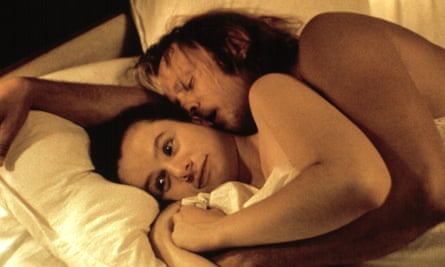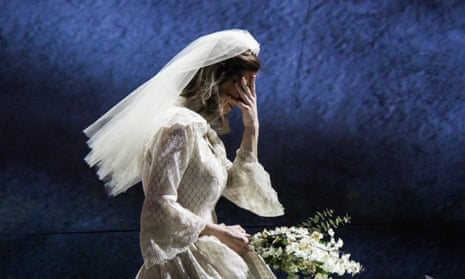The first major opera based on a film by Lars von Trier is set to debut this week, but don’t look for the famously provocative Danish director – and noted opera lover – to have a hand in the work itself.
With Breaking the Waves, composer Missy Mazzoli and librettist Royce Vavrek have adapted von Trier’s bleak 1996 fable set in an insular Calvinist community on the coast of Scotland. The work that introduced the director to the world at large, and a modern arthouse classic, it establishes themes that became constants in his later films – religious piety and obsessive love endured by a suffering heroine.
The work opens at Opera Philadelphia on Thursday. “One of the things I love about this film is that each of the characters is infinitely deep and incredibly complicated,” said Mazzoli, speaking at a recent preview for the opera at New York’s Guggenheim museum. “That’s a very attractive quality for opera.”
Von Trier has periodically used opera’s heightened emotions in his films, notably in the soundtrack to 2011’s Melancholia (featuring Wagner’s Prelude to Tristan und Isolde) and 2009’s Antichrist (Handel’s aria Lascia Ch’io Pianga). He was even scheduled to direct a production of Wagner’s four-opera Ring Cycle at the 2006 Bayreuth festival, but withdrew early on, saying he was unprepared for its technical and political complications.
In a Skype interview, von Trier said he agreed to Mazzoli and Vavrek’s proposed concept without conditions. “I believe that if you’re an artist, you have to follow your own ideas,” he said. “It was important for me not to know anything about it because then I would start giving ideas. My work was finished when the film was finished.”

Breaking the Waves has been a tough nut to crack for many audiences and critics, unsure if it’s a bold feminist statement or a chauvinistic provocation. At the film’s center is Bess (Emily Watson), a shy and troubled young woman who, defying the scowls of local church elders, marries Jan, a raffish Scandinavian oil worker (Stellan Skarsgård). After Jan is paralyzed in an accident and left in despair, he encourages Bess to sleep with other men and tell him about her experiences. Bess increasingly views promiscuity as the route to a miracle cure for Jan.
Is Jan perversely testing Bess, as some critics have suggested, or liberating her from a bad situation? “I don’t think Jan is testing Bess’s devotion,” said Mazzoli. “I don’t think he’s reveling in her pain and suffering. That, to me, is the beauty of the piece: everyone is doing what they think is the most good and still, terrible things happen. We’re very careful in the staging not to portray Jan in that way.”
Von Trier agrees with this essential reading, though expresses some regrets. “I have tried not to have bad guys in the rest of my films, but here I have chosen a relatively innocent Calvinistic group of people and turned them into bad guys, which I don’t think is really fair,” he says. “But it was good for the story. So I’ve done my best later on not to have bad guys like that.”

The idea for the opera began with Vavrek, who first encountered Breaking the Waves as a precocious 14-year-old in his native Alberta, Canada. “I saw it at the 1997 Golden Globe Awards when they showed a scene where Jan asks Bess to take up other lovers,” said Vavrek. “It just blew my mind.” Vavrek rushed out to rent the video. “I found Lars von Trier to be this master storyteller. I just loved his audacity. Breaking the Waves is something I’ve been carrying with me for 20 years.”
Mazzoli was at first leery of adapting such a prominent film, but she found “it was an idea that wouldn’t leave me alone”. She and Vavrek, who both live in Brooklyn, previously worked together on Song From the Uproar, a chamber opera about the Swiss explorer Isabelle Eberhardt. But while Vavrek’s libretti have powered a string of gritty operas, the Yale-trained Mazzoli is most identified with downtown chamber music, having written works for Kronos Quartet, Eighth Blackbird and other groups.
Yet Mazzoli was in the midst of a three-year residency at Opera Philadelphia, which, together with Beth Morrison Projects, offered her a commission. Once funding and rights were secured, she and Vavrek traveled to the film’s Scottish locations, where they spent a week studying the local accents and taking in the craggy mountainous landscapes. In her score, Mazzoli aims to evoke Gaelic Psalms, a rough-hewn style of church singing on the Isle of Skye, and the droning texture of bagpipes. “The sound of bagpipes weirdly corresponds to the Scottish landscape in such an interesting way,” she said. “It’s a very loud landscape.”

Finding a theatrical parallel to von Trier’s raw, shaky-cam documentary style fell to James Darrah, a Los Angeles-based director. He says he largely resisted a Scottish postcard approach, instead emphasizing stylized video projections of oil and water. “It’s a very slippery slope where you become very dependent on period, naturalism and all those things,” he said. “We’re trying to use choreography and visuals that are completely abstracted, in some instances, and completely nightmarish in others.” The cast, led by soprano Kiera Duffy and baritone Jon Moore, will be outfitted in early 1970s-style costumes.
Von Trier, who has a fear of flying, says he won’t attend the premiere, but admits: “I’m very curious and I would definitely like to see a video if they make one.”
Where the opera’s creators didn’t wish to dilute their source material is in the film’s tough mixture of sex and violence, entailing an advisory for adult content (Opera Philadelphia general director and president David Devan insists that “we’re doing it responsibly”). Yet ultimately, Mazzoli believes that opera’s reflective capacities can reveal new depths in the drama. At the Guggenheim preview, Moore delivered Jan’s poignant love song, which serves as an epilogue.
“It’s interesting in watching this film, how at first, you really don’t trust him,” said Mazzoli, referring to Jan. “He accidentally leads her into this place of suffering because she misconstrues what he’s telling her to do. But it is a true, true love story.”

Comments (…)
Sign in or create your Guardian account to join the discussion